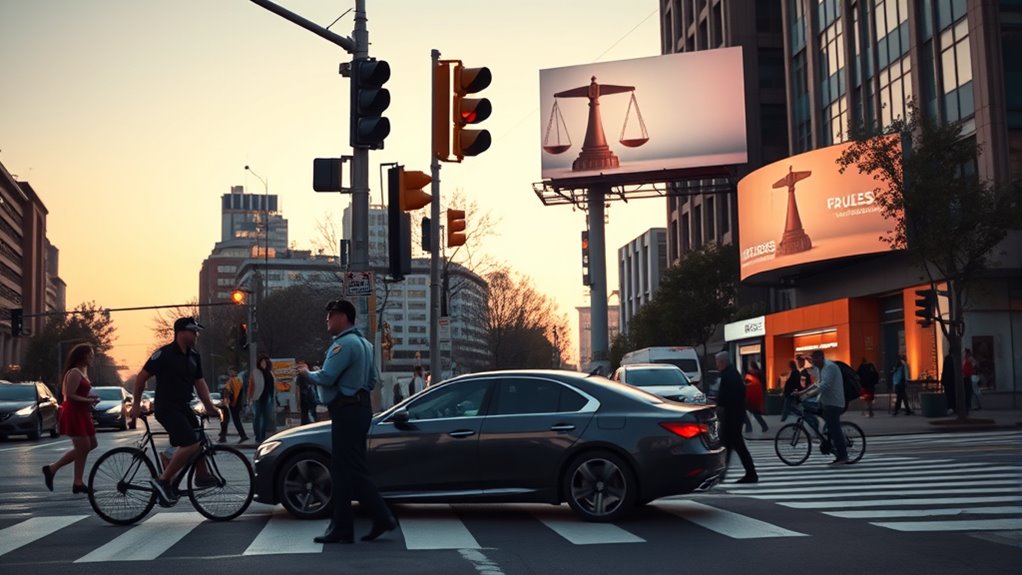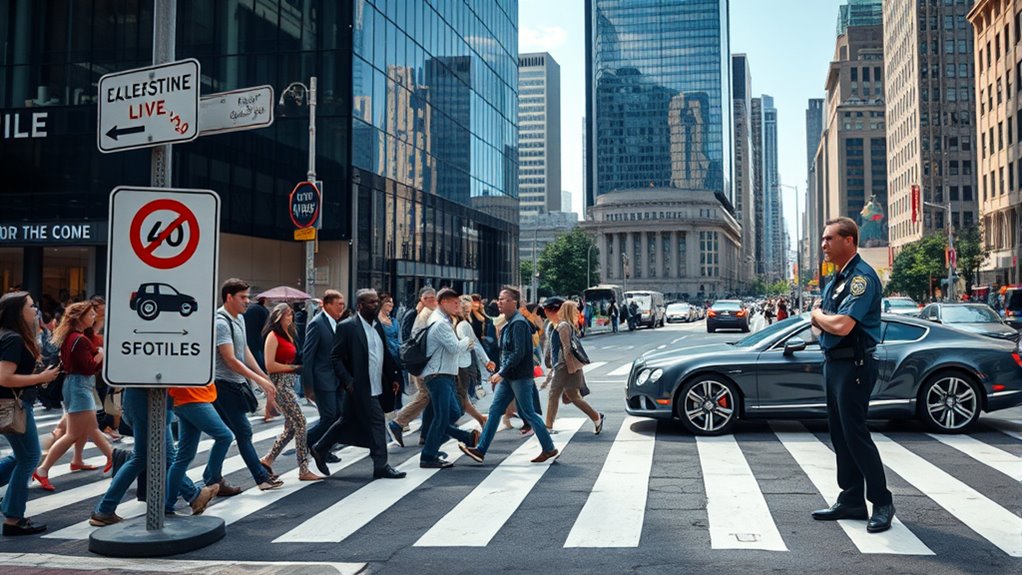You might notice that rules often apply differently based on who you are. Privileged individuals can enjoy exemptions others can’t, thanks to systemic inequalities and double standards. This means some people navigate laws and social norms with ease, while others face harsher consequences for similar actions. These gaps in privilege create unfair advantages and reinforce societal disparities. If you want to understand how these advantages persist and what can be done about them, there’s more to explore below.
Key Takeaways
- Double standards occur when privileged groups are exempt from rules that apply to others.
- Privilege gaps allow some individuals to navigate systems with fewer consequences.
- Systemic inequality perpetuates unequal enforcement, favoring the powerful.
- Recognizing privilege helps identify and challenge unfair exemptions.
- Ensuring equitable rule application promotes fairness and reduces societal disparities.

Have you ever noticed how some people seem to follow rules strictly while others bend or ignore them altogether? It’s a curious dynamic that highlights how rules aren’t always applied equally. Often, you’ll see double standards at play, where certain individuals or groups are held to different standards than others. This isn’t accidental; it’s rooted in privilege gaps—those invisible advantages that some people have based on their social status, race, gender, or economic position. These gaps create a situation where rules are more flexible for some, while others are held accountable or judged harshly for behaviors that go unchecked in more privileged circles.
Rules are applied unevenly, influenced by privilege gaps that create double standards and systemic inequality.
When you observe this, it becomes clear that rules aren’t just about fairness—they’re about power. Those with privilege gaps often navigate the system with a sense of exemption, knowing they won’t face the same consequences as others. For example, a wealthy person might break traffic laws or bend workplace policies without repercussions because they can afford legal help or have influence to shield themselves. Meanwhile, someone without such privilege might face fines, job loss, or legal trouble for the same actions. This disparity reinforces a cycle where rules serve the interests of the privileged, not everyone equally.
You might feel frustrated seeing these double standards in action. It’s tempting to believe that rules are meant to be followed equally, but reality shows that they often serve the interests of those with more power. This creates a privilege gap that influences how society perceives justice and fairness. The more privilege you have, the more likely you are to be granted exemptions or overlooked when rules are broken. Conversely, those on the lower end of the privilege spectrum find themselves held to strict standards, even for minor infractions. This imbalance perpetuates inequality and makes it harder for marginalized groups to succeed or be treated fairly.
Understanding this, you realize that challenging these double standards requires awareness and action. Recognizing privilege gaps helps you see beyond individual behaviors and understand the systemic issues at play. It’s not just about personal morality but about questioning why certain rules are enforced differently and who benefits from these disparities. As you become more aware, you can start advocating for a more equitable application of rules—one that minimizes privilege gaps and reduces double standards. Only then can society move toward fairness where rules serve everyone equally, regardless of their background or social standing. Additionally, understanding how systemic inequalities influence rule enforcement can help foster empathy and support for reform efforts.
Frequently Asked Questions
How Can I Challenge an Exemption I Believe Is Unfair?
You can challenge an exemption you believe is unfair by reviewing the challenge procedures provided by the authority. Gather evidence demonstrating why the exemption lacks fairness, such as relevant policies or facts. Submit your challenge through the official process, ensuring you follow all necessary steps and deadlines. Clearly explain why you think the exemption is unjustified, and be prepared to present your case if required.
Are There Legal Consequences for Misuse of Exemptions?
Did you know that nearly 30% of exemption abuse cases result in legal penalties? Yes, there are serious legal consequences for misuse of exemptions. If you abuse exemption rules, authorities can impose fines, revoke privileges, or even pursue criminal charges. It’s essential to understand that exemption abuse isn’t just a violation of rules but can lead to significant legal penalties, risking your reputation and freedom.
Who Enforces the Rules and Exemptions in Practice?
Enforcement agencies are responsible for upholding rules and managing exemption loopholes in practice. They oversee compliance and investigate misuse of exemptions, ensuring that individuals and organizations follow the regulations. If you attempt to exploit loopholes, these agencies can impose penalties or legal consequences. It’s essential to understand that enforcement is active, and authorities monitor for violations, so stay within the rules to avoid unintended legal issues.
Can Exemptions Be Revoked or Changed Over Time?
Yes, exemptions can be revoked or changed over time. You should stay aware of exemption renewal deadlines and any policy adjustments that might affect your status. Authorities may review and update exemptions based on new information, compliance, or changing regulations. Regularly check for updates and verify your exemption remains valid to avoid complications. Adjustments or revocations typically occur if you fail to renew or if policies evolve.
How Do Exemptions Impact Overall Fairness and Equality?
Exemptions can create fairness dilemmas and equality challenges by giving some individuals special privileges that others don’t receive. You might feel it’s unfair if exemptions benefit certain groups disproportionately, leading to perceptions of inequality. While exemptions aim to address specific needs, they can also undermine overall fairness if not applied transparently. Recognizing these impacts helps you understand how exemptions influence societal perceptions of equality and fairness.
Conclusion
It’s funny how life’s rules seem to bend when it’s your turn to be exempt. You follow the guidelines, while others seem to get away with more. Maybe it’s just a coincidence, or maybe it’s life’s way of reminding us that fairness isn’t always equal. One day, you might find yourself on the other side, wondering if luck or just fate played a part. After all, life’s little surprises keep us all guessing.









